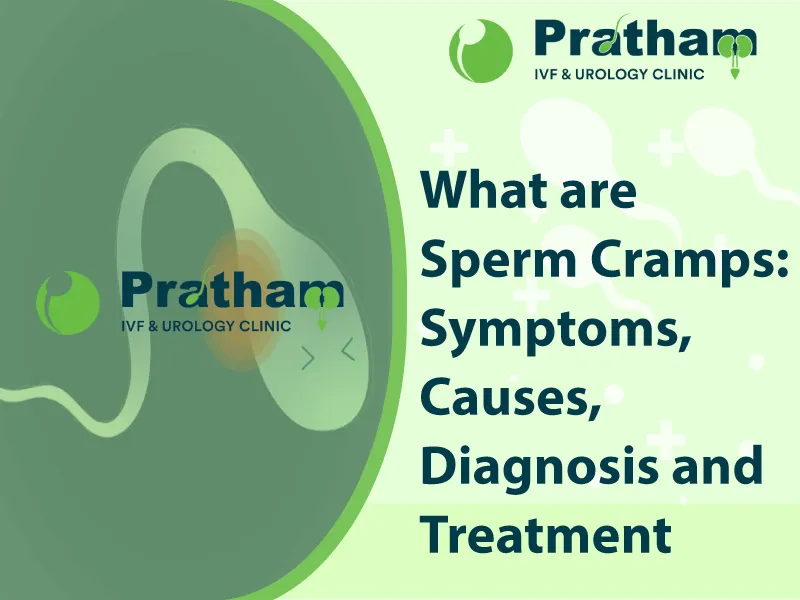
Sperm cramps, or testicular cramps, are sudden pains or discomfort in the testicles, usually occurring during or after ejaculation. While occasional discomfort is common, persistent or severe sperm cramps may signal an underlying health issue. These cramps can vary in intensity and may sometimes be linked to conditions such as infections, varicoceles, or muscle tension. Although sperm cramps are often not serious, they can be distressing and, in rare cases, may affect fertility. Understanding the symptoms, causes, and available treatments is essential for managing sperm cramps effectively. Looking for medical advice for frequent or severe cramps ensures proper diagnosis and prevents potential complications, improving overall reproductive health. If you're concerned about sperm cramps, it's important to consult a healthcare provider for personalized care and advice.
What are Sperm Cramps?
Sperm cramps, commonly known as testicular cramps or spasms, refer to sudden and uncomfortable pains occurring in the testicles. These cramps typically happen due to muscle spasms in the surrounding area or congestion within the reproductive tract, especially after prolonged sexual arousal without ejaculation. Usually unpleasant, sperm cramps are typically brief and harmless, going away on their own or with mild activity or at rest. Persistent or severe cramps might indicate underlying conditions such as infections, varicoceles, or other reproductive health issues. If symptoms persist or worsen, consulting a healthcare professional is recommended to rule out any serious concerns and receive appropriate treatment.
Symptoms of Sperm Cramps
The primary symptom of sperm cramps is pain or discomfort in the testicles, which often occurs during or after ejaculation. This discomfort can range from mild to severe and may last anywhere from a few seconds to several minutes. Some individuals may also experience a dull ache in the lower abdomen or pelvic area following ejaculation.
Other common symptoms include:
- Sharp, stabbing pain in one or both testicles.
- The testicles feel tight or heavy.
- Mild to moderate swelling or tenderness in the scrotum.
- The pain may radiate to the groin or lower back.
It’s important to note that the severity and frequency of sperm cramps can vary between individuals. Some men may experience cramps only once in a while, while others may have recurring episodes. The discomfort is usually temporary and resolves on its own, but for some, sperm cramps can become a chronic issue.
Causes of Sperm Cramps
Sperm cramps can result from a variety of factors, both medical and lifestyle-related. Some common causes include:
-
Underlying Medical Conditions
- Epididymitis: Infection of the tube that stores sperm can result in testicular enlargement, inflammation, and pain.
- Prostatitis: Inflammation of the prostate gland can lead to pelvic and testicular pain, including sperm cramps.
- Varicoceles: Enlarged veins in the scrotum can create a feeling of heaviness or discomfort in the testicles.
- Hernia: Inguinal hernias, when part of the intestine pushes through the abdominal wall into the groin area, can cause pain that mimics sperm cramps.
- Testicular Torsion: A medical emergency where the spermatic cord twists, cutting off blood flow to the testicle, can lead to severe pain.
-
Muscle Tension
Sperm cramping may also be caused by pelvic floor muscular contractions. These muscles contract during ejaculation, and if they are tense or overworked, they can cause discomfort. This can be more common in men who engage in high levels of physical activity or those who have experienced pelvic trauma.
-
Lifestyle Factors
- Dehydration: Insufficient hydration can lead to muscle cramps, including those in the pelvic region.
- Infrequent Ejaculation: Men who don’t ejaculate frequently may experience cramps during or after ejaculation, especially if there is a buildup of sperm in the reproductive tract.
- Sexual Arousal without Ejaculation: Prolonged sexual arousal without release may lead to discomfort or cramps as sperm remains in the reproductive system.
Diagnosis of Sperm Cramps
When experiencing persistent or severe sperm cramps, it’s essential to seek medical attention to determine the underlying cause. A healthcare professional would normally begin by gathering a thorough medical history and doing a physical assessment. During the exam, the doctor will look for signs of infection, swelling, or abnormalities in the testicles.
In some cases, the following tests may be performed to aid in diagnosis:
- Ultrasound: An ultrasound of the testicles can help detect varicoceles, hernias, or other structural issues.
- Urine and Blood Tests: To check for infections or inflammation that may be contributing to the pain.
- Semen Analysis: This test can provide insight into sperm quality and help identify any fertility issues.
It’s essential to consult a healthcare provider if sperm cramps become frequent, severe, or last longer than usual. Timely intervention can help avoid problems and guarantee good therapy.
Risks Associated with Sperm Cramps
While sperm cramps are usually temporary and not dangerous, certain risks and complications may arise if left untreated:
- Infertility: Chronic sperm cramps, particularly if linked to conditions like varicoceles or infections, can affect sperm production and quality, leading to infertility.
- Chronic Pain: Frequent sperm cramps can cause ongoing testicular discomfort or chronic pain, which can impact quality of life.
- Spread of Infection: If sperm cramps are caused by an infection like epididymitis or prostatitis, failing to treat the underlying infection can lead to more severe health issues.
- Testicular Damage: In cases of testicular torsion or untreated infections, there is a risk of long-term damage to the testicles, potentially affecting fertility.
- Hernia Complications: Inguinal hernias can become strangulated, which may require emergency surgery to prevent further complications.
Treatment for Sperm Cramps
Treatment for sperm cramps primarily depends on the underlying cause. Here are some common treatment approaches:
-
Lifestyle Changes
- Hydration: Drinking plenty of fluids can help prevent dehydration-related cramps.
- Exercise: Regular pelvic floor exercises can help strengthen the muscles, reducing spasms and cramps.
- Frequent Ejaculation: Engaging in regular sexual activity or masturbation may reduce the buildup of sperm and alleviate discomfort.
-
Medications
- Pain Relievers: Over-the-counter medications like ibuprofen or acetaminophen can help alleviate the discomfort associated with sperm cramps.
- Antibiotics: If the cramps are caused by an infection, antibiotics may be prescribed to treat the underlying condition.
- Anti-inflammatory Medications: In cases of inflammation, doctors may prescribe medications to reduce swelling and pain.
-
Physical Therapy
- Pelvic Floor Exercises: Strengthening the pelvic floor muscles with exercises like Kegels can help prevent muscle spasms and cramps.
-
Surgical Intervention
In rare cases, surgery may be required to treat underlying conditions like testicular torsion, varicoceles, or hernias. These procedures are usually performed by a specialist to ensure proper recovery and prevent long-term complications.
Prevention of Sperm Cramps
While it may not be possible to completely prevent sperm cramps, several lifestyle habits and practices can help reduce the risk:
- Stay Hydrated: Ensure adequate water intake throughout the day to prevent dehydration, which can contribute to muscle cramps.
- Regular Exercise: Engage in regular physical activity to improve circulation and reduce muscle tension in the pelvic region.
- Stretching: Perform gentle stretching exercises, especially before and after sexual activity, to reduce muscle stiffness and spasms.
- Maintain a Healthy Diet: A balanced diet rich in vitamins and minerals supports overall reproductive health and can help prevent muscle cramps.
- Manage Stress: Practice stress-reducing techniques like meditation or deep breathing exercises, as stress can contribute to muscle tension and cramps.
Conclusion
Sperm cramps are generally a temporary condition, but they can be uncomfortable and, in some cases, may be a sign of an underlying issue. It’s essential to understand the symptoms, causes, diagnosis, and treatment options for sperm cramps. While these cramps can be caused by various factors, seeking medical attention early can help ensure proper diagnosis and treatment.
If you experience frequent or severe sperm cramps, consider consulting a healthcare provider to rule out any serious conditions. If you’re concerned about fertility or sperm health, schedule your appointment today at Pratham IVF Center in Ahmedabad. Our expert team is here to guide you through your fertility journey with personalized care and support. Call us at +91 98797 80105 for a consultation.
 Ahmedabad Top Rated IVF Center
Ahmedabad Top Rated IVF Center




